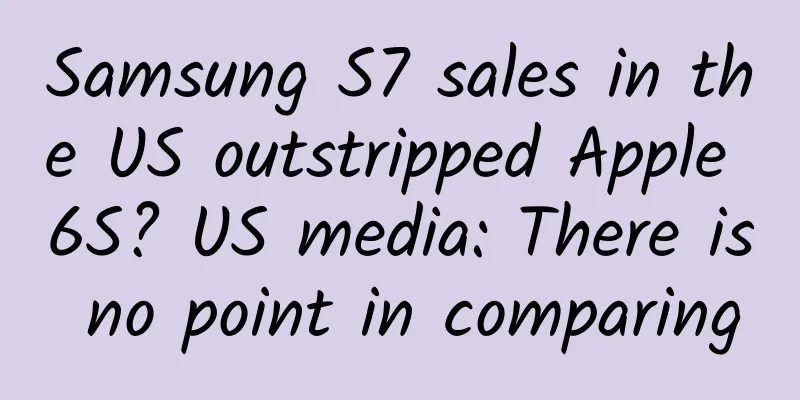Samsung S7 sales in the US outstripped Apple 6S? US media: There is no point in comparing

|
According to foreign media reports, according to a survey report by market research firm Kantar Worldpanel, Samsung Electronics' flagship Galaxy S7 has surpassed Apple's iPhone 6s in sales in the United States. The report has caused some interesting contradictions and its description has misled some people about the smartphone market. So who is the real competitor, Apple or Samsung? Samsung lost at the peak Some facts are undisputed. Samsung consistently ships more phones than Apple. But Apple's higher profits and greater influence are due to the quality of the phones it sells, not the sheer number of phones it sells. This is reflected in the average selling price of Apple's iPhone, which is above $650 for iPhones, while Android phones are only around $200. While many Chinese phone makers are focusing on making low-margin, low-priced phones, Samsung offers flagship products that cost similar or even more than the iPhone. The problem is that Samsung has not been able to sell these high-priced phones with iPhone-like quality. Back in 2014, Samsung's flagship Galaxy S4 sales reached a peak, which created the highest profit ever for its mobile division. However, when Apple launched the iPhone 6, Samsung's sales in the high-end mobile phone market suffered a heavy blow. Although Samsung's total mobile phone shipments remained at a constant level, its high-end sales plummeted by about 50%, resulting in a catastrophic blow to Samsung's mobile phone profits. Ben Bajarin, senior analyst at market research firm Creative Strategies, wrote in a blog post on October 30, "According to my comprehensive estimates, Samsung Galaxy S and Note sales fell 50% both quarter-on-quarter and year-on-year in the third quarter of 2014." Samsung's high-end Galaxy S7 has done well this year, after declining sales over the past two years, but it's not as good as Apple's, with the exception of the Galaxy S4, which also lags behind the iPhone 5. Sales in 3 days exceeded sales in 3 weeks Samsung historically launches its flagship Galaxy S in April, missing the Western holiday season and the Chinese New Year period, which are the periodic sales peaks of Apple's iPhone. Samsung's approach is not accidental or stupid. Samsung knows that it cannot compete directly with Apple when Apple launches its products. Samsung deliberately avoids direct collisions and chooses to avoid and stagger. This year, Samsung launched its Galaxy S7 earlier than usual, on March 11. That put Samsung's launch a month ahead of two high-end devices from its two main competitors, LG and HTC. Samsung does not report official sales figures for the product, but market research firm IDC estimates that the Galaxy S7 and S7 Edge shipped about 10 million units in the last three weeks of March after their launch, out of a total of 82 million units shipped in the March quarter. By comparison, the iPhone 6s was launched on Friday, September 25 last year, and Apple announced that it had sold more than 13 million units in the first three days of its launch. That quarter, Apple's total iPhone sales reached 75 million units, setting a record for sales. Apple's strength lies in the price of its products, with the average selling price of the iPhone reaching $650. In the same winter quarter, Samsung shipped millions more phones than Apple, but Samsung made less money than Apple. In the March quarter, Samsung's mobile business only made $3.38 billion, while Apple made $13.987 billion. It’s also worth noting that Samsung also rushed to launch its flagship Galaxy Note 5 in more sizes earlier than usual. Previously, the launch was scheduled for October, but last year it was moved up to August to gain a head start against the iPhone 6s Plus. This didn’t seem to have much of an effect, as Apple still had record sales in its first week and quarter. Apple faces problems Samsung doesn't Despite a record first quarter, the industry is still concerned about Apple's profits and second quarter performance expectations, believing that Apple's growth will slow down. Apple blames the global economic recession, especially the unfavorable currency exchange rate. A strong dollar will effectively increase the price of Apple products overseas, especially in China. This is not a problem faced by Samsung, which reports its financial results in Korean won. However, many analysts and bloggers are unwilling to accept Apple's performance numbers and instead fabricate so-called facts, claiming that high-end smartphones no longer have any growth potential, especially in developed markets such as the United States. Many of them repeatedly and mechanically say that "everyone who wants an iPhone already has an iPhone now." These people point out that Samsung's high-end phone sales figures are growing faster than Apple's, and that iPhone sales are declining year-on-year compared to the growth of Galaxy S7 sales. In the second quarter of last year, Apple sold 61.2 million iPhones, compared with just 51.2 million in the same period this year. The Galaxy S7's growth is attributed to the failure of the previous S6. Samsung said that it lost the window of opportunity due to insufficient supply of the products that consumers wanted and failed to meet consumer demand. Samsung's "growth" is not more exciting than the iPhone, because Samsung's growth may be due to bundled promotions, which include VR headsets, tablets, TVs and buy one get one free. That doesn't count as real growth, with Neil Shah, research director at market researcher Counterpoint, predicting the Galaxy S7 will be just as popular as the S4, which launched three years ago. Apple's sales are down from the iPhone 6 peak a year ago, but up significantly from the iPhone 5 in 2014. Samsung's flagship has been declining for years and is in a terrible position against the iPhone 5. Comparing market share with incomparable numbers can often lead us astray. Samsung's 'growth' report is unfair Furthermore, while Samsung reversed the decline in its flagship products, its overall smartphone sales actually declined slightly. IDC noted in April that "Samsung remained the global smartphone market leader, although its shipments fell 0.6% year-over-year." After failing to surpass the iPhone 6 sales peak a year earlier, Apple was deemed to be doomed to perish, and Samsung took two years to return to its 2014 peak, though it has made little real progress since. Dispelling the notion that iPhone buyers are moving to Samsung in droves, Lauren Guenveur, an analyst at Kantar Worldpanel, said in a research note released this week that in the U.S., “the majority of sales are from consumers repurchasing and upgrading from their favorite brands. Among consumers who plan to change their device in the next year, 88% of current Apple users and 86% of current Samsung users plan to stay with their original brand.” However, among the buyers who changed brands, the proportion of buyers who switched to Apple increased by 2.8 times. The research report said that only 5% of buyers who switched to Samsung were from Apple, while 14% of buyers who switched to Apple were from Samsung. Based on this research report, Vlad Savov, a special contributor to the American technology media, said, "Samsung's Galaxy S7 sells more in the United States than Apple's iPhone 6S." However, the writer also pointed out, "Of course this is not a fair comparison, because Samsung's S7 and S7 Edge are newer products in a year and a half." In addition, it is unfair to ignore the 13 million sales of iPhone 6s in the first three days after its launch and 113 million sales in two quarters, and only pay attention to Samsung's fragmentary sales figures and make the final sales comparison based on the conclusions of this research report. Apple and Samsung's battle in China The US media report also ignored the rest of the numbers in the Kantar Worldpanel research report. This includes figures from China, where Samsung's market share in Chinese cities has fallen from 34% in 2014 to 9% now. Samsung's once dominant position in the Chinese market has now given way to Apple and Huawei. Furthermore, while Willard Saviveo claims that Samsung is a brand with high loyalty in the United States, he ignores the situation in the Chinese market. Kantar Worldpanel's research report states that Samsung's brand loyalty in the Chinese market "remains low." Kantar Worldpanel's research report states that 24% of Huawei buyers are converted from Samsung, while 25% of iPhone buyers are converted from Samsung, a figure that is even higher than in the United States. This is consistent with the figures stated by Apple CEO Tim Cook, who said that the number of users switching from Android to iPhone has reached a record high. Samsung should be applauded for resolving its Galaxy S supply issues this year, but it doesn't need to create false headlines pretending it's doing better than Apple, especially since its high-end product sales have not grown in the past two years, its smartphone sales have not made substantial progress, and it has completely lost its leadership in the Chinese market. As a winner of Toutiao's Qingyun Plan and Baijiahao's Bai+ Plan, the 2019 Baidu Digital Author of the Year, the Baijiahao's Most Popular Author in the Technology Field, the 2019 Sogou Technology and Culture Author, and the 2021 Baijiahao Quarterly Influential Creator, he has won many awards, including the 2013 Sohu Best Industry Media Person, the 2015 China New Media Entrepreneurship Competition Beijing Third Place, the 2015 Guangmang Experience Award, the 2015 China New Media Entrepreneurship Competition Finals Third Place, and the 2018 Baidu Dynamic Annual Powerful Celebrity. |
<<: How long can eroticism, horror and bad taste sustain online movies?
>>: SoftBank's acquisition of ARM: The former found a cash cow and the latter found a backer
Recommend
Operation and promotion plan of offline and new media channels!
In the last issue, we mainly learned about the on...
What is it that prevents me from getting “young people’s first cup of Moutai”?
This issue is planned by: Rain, 91, Little Dandel...
How dirty is your washing machine? We take it apart to show you!
Did you know that the washing machine that washes...
Can an individual make money by operating a WeChat mini program?
Q: Can I make money by operating a WeChat mini pr...
How to plan an excellent event? Follow these 5 steps
Whether you are doing user operations, new media ...
Mindbody: 2023 Predictions
Mindbody has released its 2023 Predictions Report...
Why do Chinese people have to eat something red during Chinese New Year?
Written by Wei Shuihua Header image | Visual Chin...
Science in this week's hot topics | How much privacy can a photo reveal?
Recently, girls are practicing with Liu Genghong,...
Before a major epidemic, how should companies select topics for their new media operations?
The moment the hot topic came, it seemed that eve...
How to effectively activate new users? These 3 things you need to know
We all know that attracting new customers is impo...
Who is being cheated by the Windows 10 forced upgrade?
As early as when Windows 10 was released, Microsof...
Take stock of the characteristics and value of brand loyalty!
Brand loyalty is often mentioned in daily communi...
I am not good at math, is there any hope for my child’s math?
You may have heard many jokes that make fun of ma...
The most complete and powerful analysis: Internal analysis of the Alipay wallet system architecture (architecture diagram)
Overview of Alipay System Architecture Typical pr...
Introduction to Baidu’s information flow advertising promotion billing methods and creative forms!
What is information flow advertising? Information...









